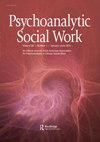Reconsidering Graduate Training and Clinical Practice: The Importance of Psychodynamic Thinking
IF 0.3
Q4 SOCIAL WORK
引用次数: 1
Abstract
Abstract Treatment can be powerfully informed by the exploration of psychodynamic concepts. Yet, many graduate social work programs struggle to adequately examine these ideas. Psychodynamic practice has transformed from a framework of long-term private practice, which requires multiple sessions a week, to a contemporary framework that can integrate into any modality, frequency, setting, and length of treatment. Literature on the psychodynamic approach has not been effectively incorporated into most current graduate programs. This article addresses this gap in social work education by advocating for graduate-school coursework focusing on—at a minimum—the concepts of (a) the unconscious, (b) transference, and (c) countertransference. In the following pages, we offer a synopsis of current graduate-level coursework, and an examination of psychodynamic thinking, including its base of evidence and value in contemporary treatment. This article explores an integrative approach to training and practice. We argue that understanding these fundamental psychodynamic concepts creates a more nuanced, deeper, and impactful treatment and that training in this area is beneficial to all social workers.重新思考研究生培养与临床实践:心理动力思维的重要性
对心理动力学概念的探索可以有力地为抽象治疗提供信息。然而,许多研究生社会工作项目很难充分审视这些想法。心理动力实践已经从一个每周需要多次治疗的长期私人实践框架转变为一个可以融入任何治疗方式、频率、环境和时间的现代框架。关于心理动力学方法的文献并没有有效地纳入大多数当前的研究生课程。本文通过倡导研究生院课程至少关注(a)无意识、(b)移情和(c)反移情的概念来解决社会工作教育中的这一差距。在接下来的几页中,我们提供了当前研究生水平课程的概要,并对心理动力思维进行了检查,包括其在当代治疗中的证据基础和价值。本文探讨了一种综合训练和实践的方法。我们认为,理解这些基本的心理动力学概念可以创造一种更细致、更深入、更有影响力的治疗方法,这方面的培训对所有社会工作者都是有益的。
本文章由计算机程序翻译,如有差异,请以英文原文为准。
求助全文
约1分钟内获得全文
求助全文
来源期刊

Psychoanalytic Social Work
SOCIAL WORK-
CiteScore
0.40
自引率
0.00%
发文量
27
期刊介绍:
Psychoanalytic Social Work provides social work clinicians and clinical educators with highly informative and stimulating articles relevant to the practice of psychoanalytic social work with the individual client. Although a variety of social work publications now exist, none focus exclusively on the important clinical themes and dilemmas that occur in a psychoanalytic social work practice. Existing clinical publications in social work have tended to dilute or diminish the significance or the scope of psychoanalytic practice in various ways. Some social work journals focus partially on clinical practice and characteristically provide an equal, if not greater, emphasis upon social welfare policy and macropractice concerns.
 求助内容:
求助内容: 应助结果提醒方式:
应助结果提醒方式:


